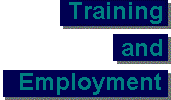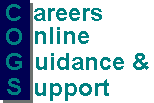|
Job Search Methods
The first challenge is to seek out where the job vacancies exist. Maybe the most obvious ways include:
- Job advertisements in newspapers, magazines and journals,
(remember that many newspapers advertise jobs on certain days of the week)
- school / college careers notice boards
- Careers offices
- Job Centres (dealing mainly with people over 18)
- company gate notices
- TV (teletext) and radio
- Recruitment Agencies for people with some job experience
There are also 'invisible' methods where vacancies are not advertised publicly. It is worth noting that estimates indicate around 70% of job opportunities come from the 'invisible' employment market.
'Invisible' methods include:
- direct or 'on-spec' (speculative) enquiries. This means writing to or contacting firms to enquire if they have any work. In this case employers may be impressed by the applicants initiative.
- word of mouth recommendations
- networking, the name now given to what used to be called 'the old boy network'. Networking is about using the span of people we know and in turn the people they know for information about employment opportunities
- letters and telephone calls - during the course of one job application it may be necessary to write or telephone an employer on several occasions
General tips about letter writing
- keep the letter short, preferably one side of A4
- include the job vacancy reference or job title
- neatly write or type your letter on good quality paper
- if applying for a job (but not including a CV) be sure to include at least details of age / school / qualifications / relevant experience / hobbies / interest / referees
- be positive and sound enthusiastic
- be sure to get someone to check over your letter for mistakes
General tips about making telephone calls
- be prepared - know what you want to say (write it down first). Also be prepared to leave a message on an answerphone and remember to leave your name and telephone number
- plan the timing of your call - many office people attend meetings during the course of the day; it can sometimes be better to ring early to catch them in
- be ready to answer questions about yourself
- choose somewhere quiet to make the call and have pen and paper ready
- try to sound confident, keen and friendly
- thank the person at the other end of the phone for their help
- make a note of the date and details of the call
|






